Unit 12 What did you do last weekend?Section A Grammar Focus-3c课件(共有PPT33张)
文档属性
| 名称 | Unit 12 What did you do last weekend?Section A Grammar Focus-3c课件(共有PPT33张) | 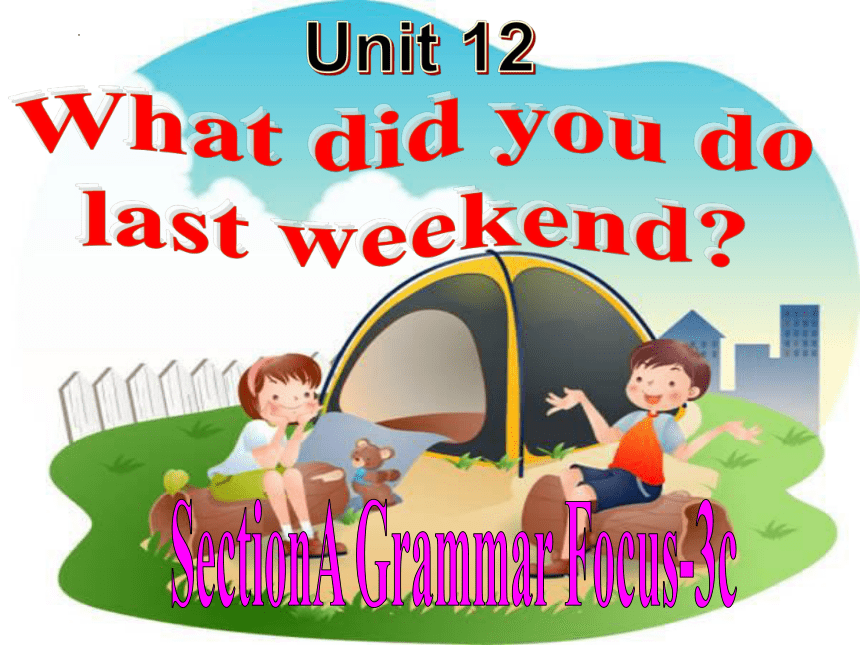 | |
| 格式 | zip | ||
| 文件大小 | 467.1KB | ||
| 资源类型 | 教案 | ||
| 版本资源 | 人教新目标(Go for it)版 | ||
| 科目 | 英语 | ||
| 更新时间 | 2022-03-27 10:31:57 | ||
图片预览


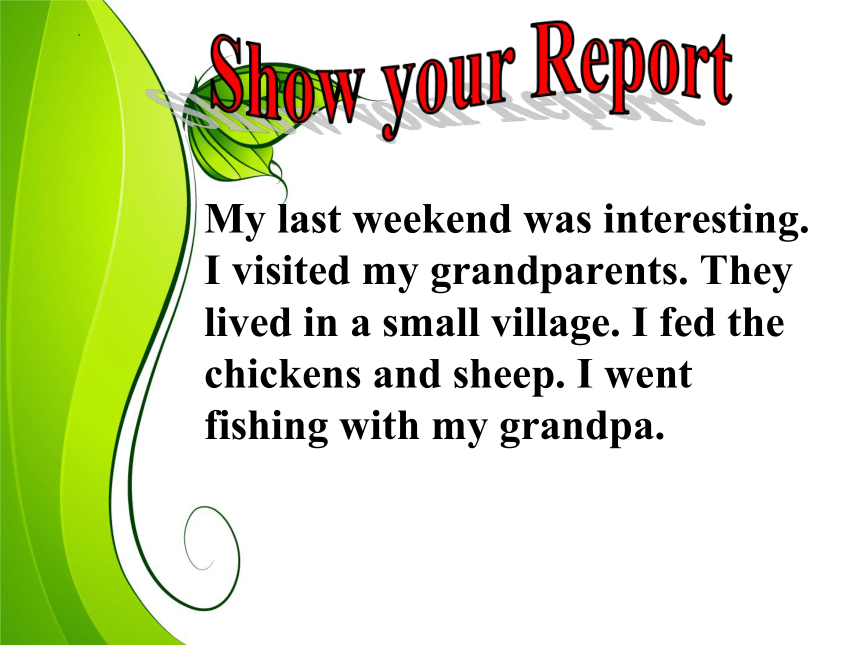
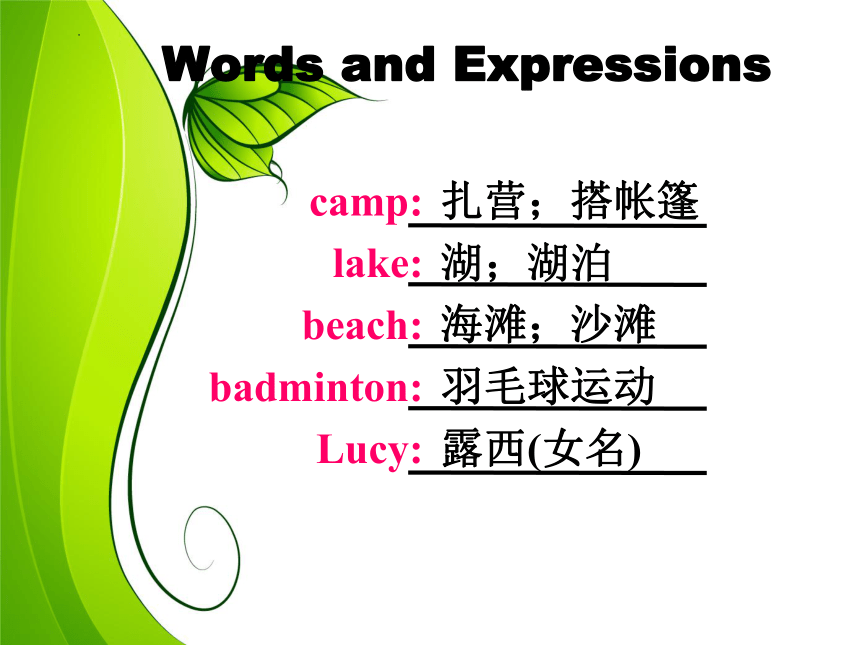
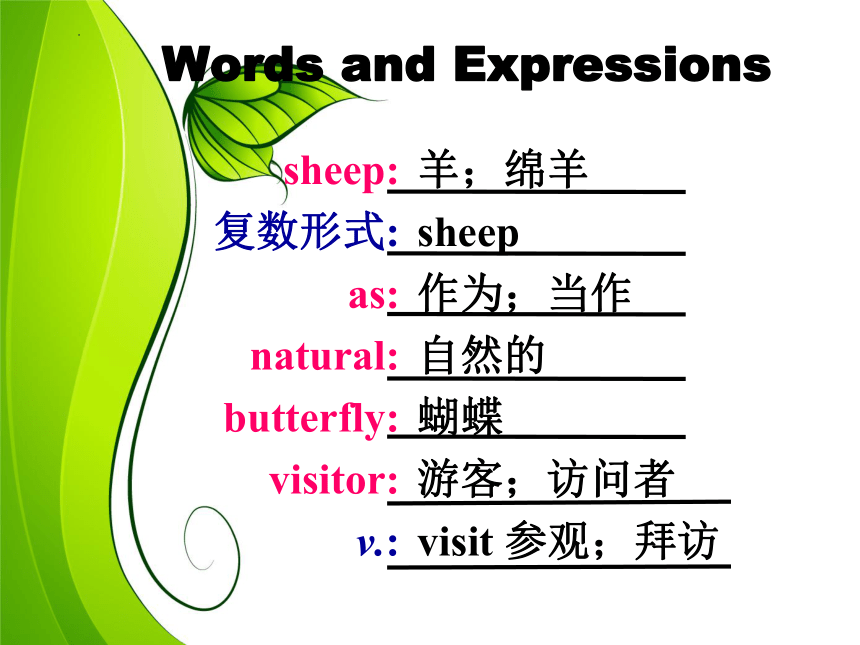
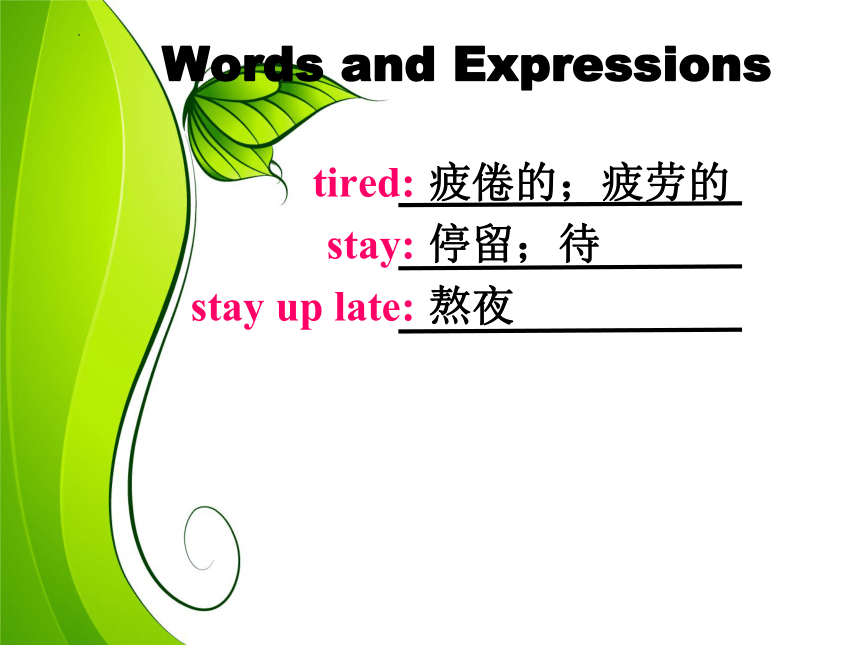
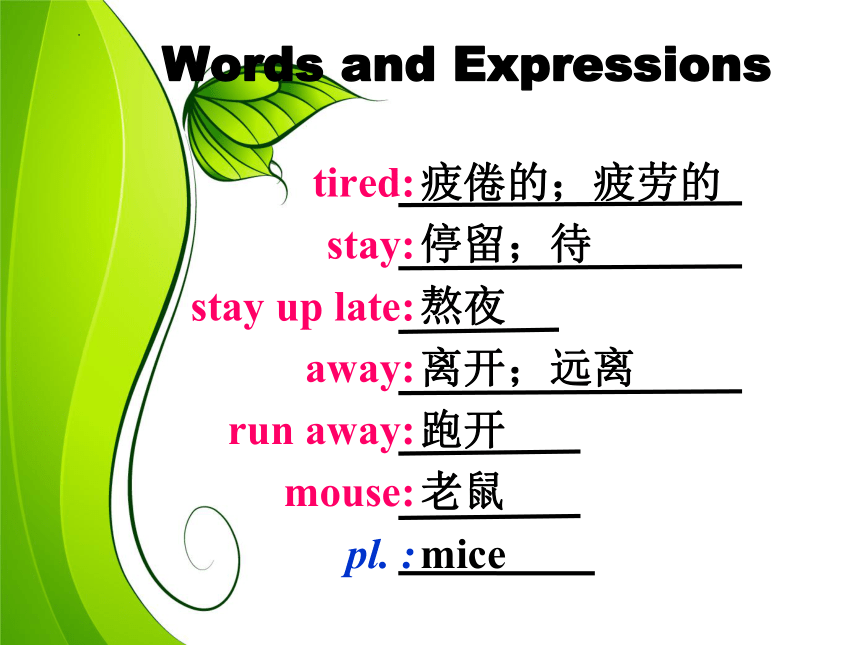

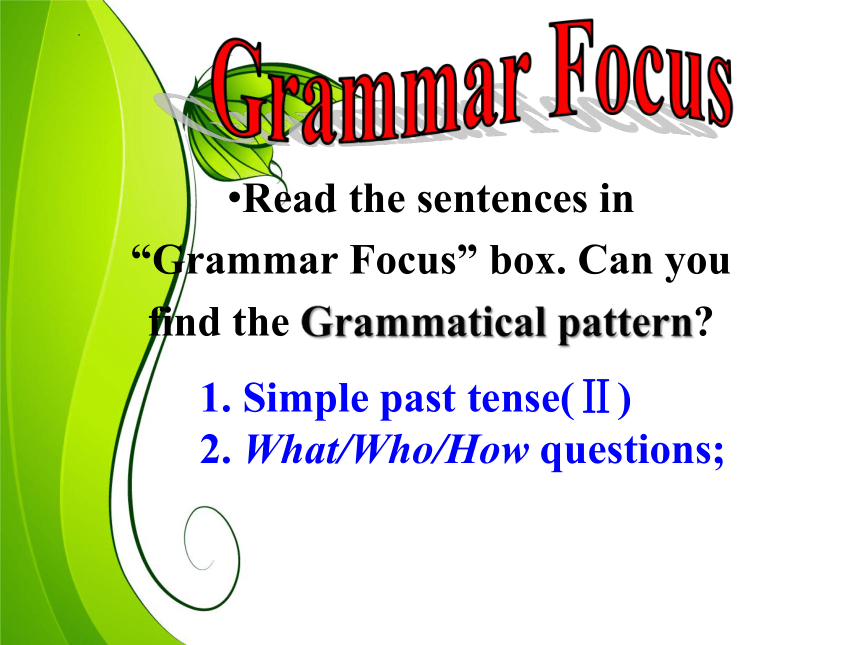
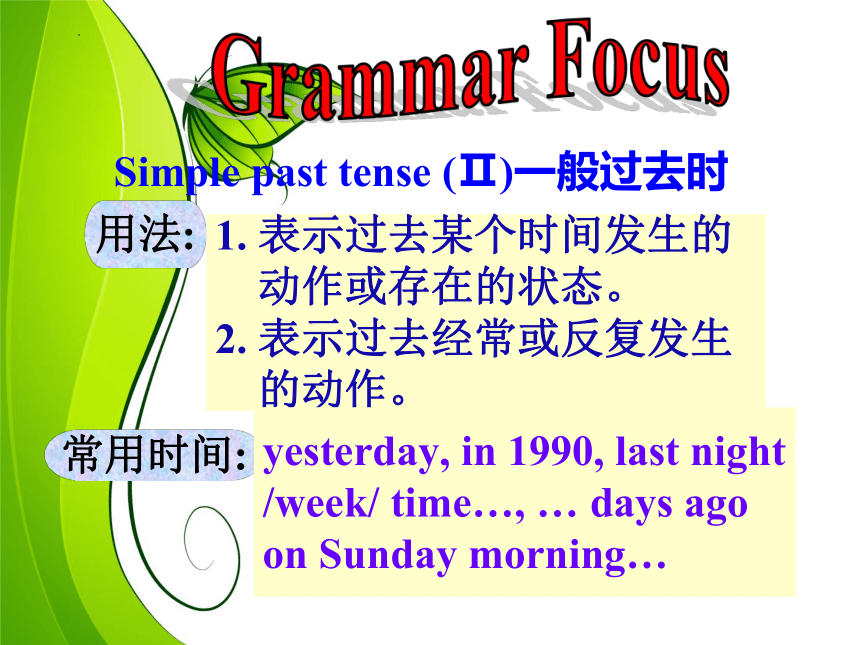
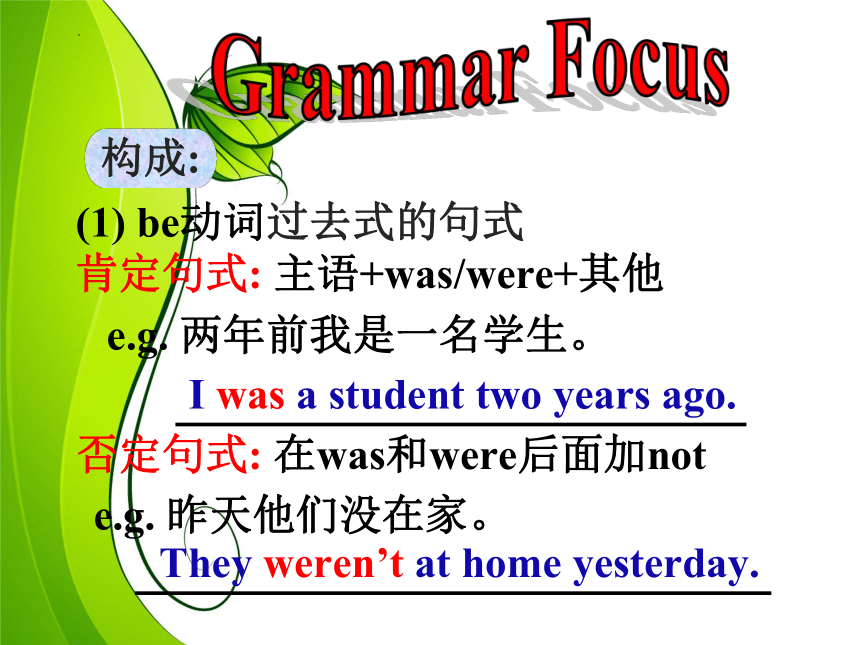
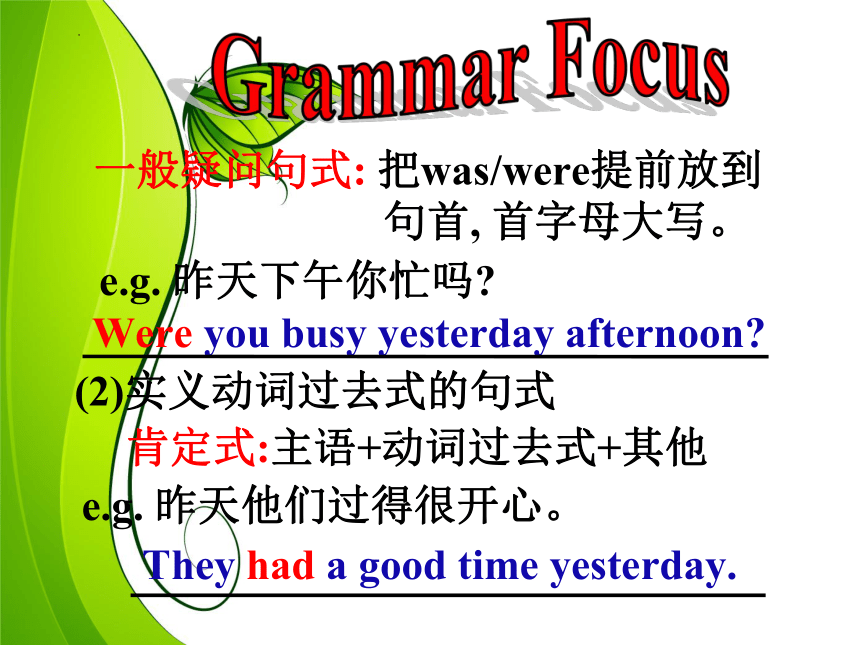
文档简介
(共33张PPT)
What did you do
last weekend
Unit 12
SectionA Grammar Focus-3c
What did you do last weekend
Where did you do
Who did you do with
Show your Report
My last weekend was interesting. I visited my grandparents. They lived in a small village. I fed the chickens and sheep. I went fishing with my grandpa.
Show your Report
Words and Expressions
camp:
lake:
beach:
badminton:
Lucy:
扎营;搭帐篷
湖;湖泊
海滩;沙滩
羽毛球运动
露西(女名)
Words and Expressions
sheep:
复数形式:
as:
natural:
butterfly:
visitor:
v.:
羊;绵羊
sheep
作为;当作
自然的
蝴蝶
游客;访问者
visit 参观;拜访
Words and Expressions
tired:
stay:
stay up late:
疲倦的;疲劳的
停留;待
熬夜
Words and Expressions
tired:
stay:
stay up late:
away:
run away:
mouse:
pl. :
疲倦的;疲劳的
停留;待
熬夜
离开;远离
跑开
老鼠
mice
Words and Expressions
baby:
shout:
shout at:
woof:
language:
fly:
kite:
fly a kite:
幼小的;婴儿
呼叫;喊叫
冲…大声叫嚷
汪汪
语言
飞
风筝
放风筝
过去式:
flew
Read the sentences in “Grammar Focus” box. Can you find the Grammatical pattern
1. Simple past tense(Ⅱ)
2. What/Who/How questions;
Grammar Focus
用法:
1. 表示过去某个时间发生的
动作或存在的状态。
2. 表示过去经常或反复发生
的动作。
Simple past tense (Ⅱ)一般过去时
常用时间:
yesterday, in 1990, last night
/week/ time…, … days ago
on Sunday morning…
Grammar Focus
构成:
(1) be动词过去式的句式
肯定句式: 主语+was/were+其他
e.g. 两年前我是一名学生。
I was a student two years ago.
否定句式: 在was和were后面加not
e.g. 昨天他们没在家。
They weren’t at home yesterday.
Grammar Focus
一般疑问句式: 把was/were提前放到
句首, 首字母大写。
e.g. 昨天下午你忙吗
Were you busy yesterday afternoon
(2)实义动词过去式的句式
肯定式:主语+动词过去式+其他
e.g. 昨天他们过得很开心。
They had a good time yesterday.
Grammar Focus
否定式: 主语+did not(didn’t)+动词
原形+其他;
e.g. 昨天晚上他们没看电视。
They didn’t watch TV last night.
一般疑问句: Did +主语+动词原形+其
他
肯定回答: Yes, 主语+did.
否定回答: No, 主语+didn’t.
Grammar Focus
e.g. —昨天你去看电影了吗
—我去了。/不,我没去。
—Did you go to the movies
yesterday
—Yes, I did. /No, I didn’t.
Grammar Focus
特殊疑问句: 疑问词+did+主语+动
词原形+其他
e.g. 你几点完成的作业
What time did you finish your
homework
Grammar Focus
动词过去式的构成:
1. work—worked, look—looked
2. live—lived, use—used
直接加 ed;
以不发音的e结尾的单词,直接加d;
Grammar Focus
3. study—studied, worry—worried
4. enjoy—enjoyed, play—played
以辅音字母+y结尾的单词,变y为i加ed;
以元音字母+y结尾的,直接加ed;
Grammar Focus
5. stop—stopped, plan—planned
6. have—had, are—were
get—got, do/does—did
以重读闭音节结尾的,双写最后的辅音字母加ed;
不规则变化的动词过去式。
Grammar Focus
巧记一般过去时
动词一般过去时,表示过去发生事;
be用was或用were, have, has变had;
谓语动词过去式,过去时间坐标志;
一般动词加-ed,若是特殊得硬记。
否定句很简单,主语之后didn’t添;
疑问句也不难,did放在主语前;
如果谓语之前有did,谓语动词需还原;
动词若是was, were,否定就把not添。
Grammar Focus
1. A: ______ did you do last weekend
B: I played badminton on Saturday.
A: Sounds fun! _____ did you play with
B: I played with my father. He’s really good!
What
Who
I Can Do
3a
此类填空题,应主要根据答语的意思来确定问句中所缺的特殊疑问词是什么。第一句的答语是活动,故第一空格处应填what;第二句答语强调了人物,故问句中的特殊词为who。
思路指导
2. A: _____ was your weekend
B: It was great! I had so much fun!
A: _______ did you go
B: The weather was beautiful, so I
went to the beach with my
parents.
How
Where
I Can Do
3a
第一句的答语意为“很棒”,故问句应是询问周末过得怎么样。因此应填how;
第二句答语回答了与父母亲去了海滩一事,故问句中应是询问地点,且问句中没有介词with (与……一起),因此应填where。
思路指导
3. A: ______ did Jim lose
B: He lost his keys. He often loses things.
A: That’s too bad. ______ did he lose
them
B: I heard it was yesterday.
What
When
I Can Do
3a
第一句的答语意为“他丢了他的钥匙”,再由问句中有lose一词,可知问句应是询问丢了什么,因此应填what;
第二句答语回答听说是昨天,故问句中应是询问何时丢钥匙的,因此应填when。
思路指导
1. 这是一个短文填空题,用所给动词
的正确时态将短文内容补充完整。
2. 先应通读一遍短文来掌握文章的大
意,然后通过文中的一些重点句子
的时态来确定整个故事发生的时间。
3b
思路指导
由第一句中的“were”及时间状语“on Saturday morning”,可以确定本文的故事发生在过去,故除了一些直接引语句子外,应用一般过去时态。
3. 细读每一句话,根据上下文意来推
敲空格处的意思,确定用哪一个词
汇,写出其正确的形式。
3b
思路指导
A family of mice were in the kitchen on Saturday morning when they ____ a big cat. Baby Mouse _____ afraid and _________ onto his father’s back.
saw
was
I Can Do
3b
say be climb see run away
climbed
Father Mouse shouted at the cat, “Woof, woof!” The cat quickly _________. “Wow, Dad, you’re good!” ____ Baby Mouse. “Well, son, that’s why it’s important to learn a second language, ” answered Father Mouse.
ran away
said
I Can Do
3b
1. shout at:
后面要跟人或事物。
e.g. 不要朝孩子们大声喊叫。
2. run away:
Language points
冲......大声叫嚷
Don’t shout at the children.
跑开
3. language: 是可数名词。
e.g. 英语、汉语、法语是三种不同的语
言。
Language points
语言
English, Chinese and French are
three different languages.
Homework
1. Copy and remember the new
words and expressions;
2. Make a report (Think of two
interesting things you did in
the last month. Then write them
down in English. 3c).
Thank you!
Ninety-nine percent of the failures
come from people who have
the habit of making excuses.
百分之九十九的失败
都是由习惯找借口的人造成的。
What did you do
last weekend
Unit 12
SectionA Grammar Focus-3c
What did you do last weekend
Where did you do
Who did you do with
Show your Report
My last weekend was interesting. I visited my grandparents. They lived in a small village. I fed the chickens and sheep. I went fishing with my grandpa.
Show your Report
Words and Expressions
camp:
lake:
beach:
badminton:
Lucy:
扎营;搭帐篷
湖;湖泊
海滩;沙滩
羽毛球运动
露西(女名)
Words and Expressions
sheep:
复数形式:
as:
natural:
butterfly:
visitor:
v.:
羊;绵羊
sheep
作为;当作
自然的
蝴蝶
游客;访问者
visit 参观;拜访
Words and Expressions
tired:
stay:
stay up late:
疲倦的;疲劳的
停留;待
熬夜
Words and Expressions
tired:
stay:
stay up late:
away:
run away:
mouse:
pl. :
疲倦的;疲劳的
停留;待
熬夜
离开;远离
跑开
老鼠
mice
Words and Expressions
baby:
shout:
shout at:
woof:
language:
fly:
kite:
fly a kite:
幼小的;婴儿
呼叫;喊叫
冲…大声叫嚷
汪汪
语言
飞
风筝
放风筝
过去式:
flew
Read the sentences in “Grammar Focus” box. Can you find the Grammatical pattern
1. Simple past tense(Ⅱ)
2. What/Who/How questions;
Grammar Focus
用法:
1. 表示过去某个时间发生的
动作或存在的状态。
2. 表示过去经常或反复发生
的动作。
Simple past tense (Ⅱ)一般过去时
常用时间:
yesterday, in 1990, last night
/week/ time…, … days ago
on Sunday morning…
Grammar Focus
构成:
(1) be动词过去式的句式
肯定句式: 主语+was/were+其他
e.g. 两年前我是一名学生。
I was a student two years ago.
否定句式: 在was和were后面加not
e.g. 昨天他们没在家。
They weren’t at home yesterday.
Grammar Focus
一般疑问句式: 把was/were提前放到
句首, 首字母大写。
e.g. 昨天下午你忙吗
Were you busy yesterday afternoon
(2)实义动词过去式的句式
肯定式:主语+动词过去式+其他
e.g. 昨天他们过得很开心。
They had a good time yesterday.
Grammar Focus
否定式: 主语+did not(didn’t)+动词
原形+其他;
e.g. 昨天晚上他们没看电视。
They didn’t watch TV last night.
一般疑问句: Did +主语+动词原形+其
他
肯定回答: Yes, 主语+did.
否定回答: No, 主语+didn’t.
Grammar Focus
e.g. —昨天你去看电影了吗
—我去了。/不,我没去。
—Did you go to the movies
yesterday
—Yes, I did. /No, I didn’t.
Grammar Focus
特殊疑问句: 疑问词+did+主语+动
词原形+其他
e.g. 你几点完成的作业
What time did you finish your
homework
Grammar Focus
动词过去式的构成:
1. work—worked, look—looked
2. live—lived, use—used
直接加 ed;
以不发音的e结尾的单词,直接加d;
Grammar Focus
3. study—studied, worry—worried
4. enjoy—enjoyed, play—played
以辅音字母+y结尾的单词,变y为i加ed;
以元音字母+y结尾的,直接加ed;
Grammar Focus
5. stop—stopped, plan—planned
6. have—had, are—were
get—got, do/does—did
以重读闭音节结尾的,双写最后的辅音字母加ed;
不规则变化的动词过去式。
Grammar Focus
巧记一般过去时
动词一般过去时,表示过去发生事;
be用was或用were, have, has变had;
谓语动词过去式,过去时间坐标志;
一般动词加-ed,若是特殊得硬记。
否定句很简单,主语之后didn’t添;
疑问句也不难,did放在主语前;
如果谓语之前有did,谓语动词需还原;
动词若是was, were,否定就把not添。
Grammar Focus
1. A: ______ did you do last weekend
B: I played badminton on Saturday.
A: Sounds fun! _____ did you play with
B: I played with my father. He’s really good!
What
Who
I Can Do
3a
此类填空题,应主要根据答语的意思来确定问句中所缺的特殊疑问词是什么。第一句的答语是活动,故第一空格处应填what;第二句答语强调了人物,故问句中的特殊词为who。
思路指导
2. A: _____ was your weekend
B: It was great! I had so much fun!
A: _______ did you go
B: The weather was beautiful, so I
went to the beach with my
parents.
How
Where
I Can Do
3a
第一句的答语意为“很棒”,故问句应是询问周末过得怎么样。因此应填how;
第二句答语回答了与父母亲去了海滩一事,故问句中应是询问地点,且问句中没有介词with (与……一起),因此应填where。
思路指导
3. A: ______ did Jim lose
B: He lost his keys. He often loses things.
A: That’s too bad. ______ did he lose
them
B: I heard it was yesterday.
What
When
I Can Do
3a
第一句的答语意为“他丢了他的钥匙”,再由问句中有lose一词,可知问句应是询问丢了什么,因此应填what;
第二句答语回答听说是昨天,故问句中应是询问何时丢钥匙的,因此应填when。
思路指导
1. 这是一个短文填空题,用所给动词
的正确时态将短文内容补充完整。
2. 先应通读一遍短文来掌握文章的大
意,然后通过文中的一些重点句子
的时态来确定整个故事发生的时间。
3b
思路指导
由第一句中的“were”及时间状语“on Saturday morning”,可以确定本文的故事发生在过去,故除了一些直接引语句子外,应用一般过去时态。
3. 细读每一句话,根据上下文意来推
敲空格处的意思,确定用哪一个词
汇,写出其正确的形式。
3b
思路指导
A family of mice were in the kitchen on Saturday morning when they ____ a big cat. Baby Mouse _____ afraid and _________ onto his father’s back.
saw
was
I Can Do
3b
say be climb see run away
climbed
Father Mouse shouted at the cat, “Woof, woof!” The cat quickly _________. “Wow, Dad, you’re good!” ____ Baby Mouse. “Well, son, that’s why it’s important to learn a second language, ” answered Father Mouse.
ran away
said
I Can Do
3b
1. shout at:
后面要跟人或事物。
e.g. 不要朝孩子们大声喊叫。
2. run away:
Language points
冲......大声叫嚷
Don’t shout at the children.
跑开
3. language: 是可数名词。
e.g. 英语、汉语、法语是三种不同的语
言。
Language points
语言
English, Chinese and French are
three different languages.
Homework
1. Copy and remember the new
words and expressions;
2. Make a report (Think of two
interesting things you did in
the last month. Then write them
down in English. 3c).
Thank you!
Ninety-nine percent of the failures
come from people who have
the habit of making excuses.
百分之九十九的失败
都是由习惯找借口的人造成的。
同课章节目录
- Unit 1 Can you play the guitar?
- Section A
- Section B
- Unit 2 What time do you go to school?
- Section A
- Section B
- Unit 3 How do you get to school?
- Section A
- Section B
- Unit 4 Don't eat in class.
- Section A
- Section B
- Unit 5 Why do you like pandas?
- Section A
- Section B
- Unit 6 I'm watching TV.
- Section A
- Section B
- Review of Units 1-6
- Unit 7 It's raining!
- Section A
- Section B
- Unit 8 Is there a post office near here?
- Section A
- Section B
- Unit 9 What does he look like?
- Section A
- Section B
- Unit 10 I'd like some noodles.
- Section A
- Section B
- Unit 11 How was your school trip?
- Section A
- Section B
- Unit 12 What did you do last weekend?
- Section A
- Section B
